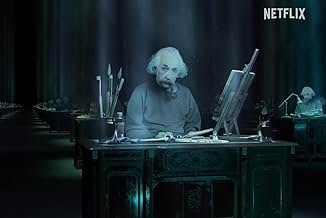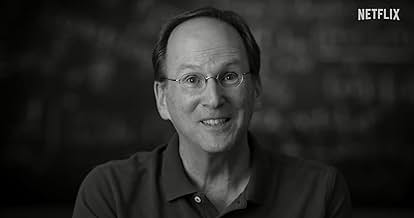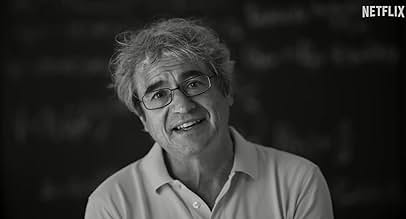PUNTUACIÓN EN IMDb
7,0/10
4,4 mil
TU PUNTUACIÓN
¿Existe el infinito? ¿Podemos experimentar el Infinito? En una película animada (creada por artistas de 10 países), los científicos más vanguardistas del mundo van en busca del infinito y su... Leer todo¿Existe el infinito? ¿Podemos experimentar el Infinito? En una película animada (creada por artistas de 10 países), los científicos más vanguardistas del mundo van en busca del infinito y sus alucinantes implicaciones para el universo.¿Existe el infinito? ¿Podemos experimentar el Infinito? En una película animada (creada por artistas de 10 países), los científicos más vanguardistas del mundo van en busca del infinito y sus alucinantes implicaciones para el universo.
- Dirección
- Guión
- Reparto principal
Rebecca Newberger Goldstein
- Self - Philosopher
- (as Rebecca Goldstein)
Reseñas destacadas
I have no idea why some people would give this a high score. This is not a documentary. This is some nice visuals with lose incoherent points that are never made. If you give it a low score, you must not understand it right, cause your brain is to small? It has a few good points, but most of it is just empty space and very little science. Hire a few smart people, make them say some stuff, add visuals, done. Netflix almost always makes horrible documentaries. Just buy this sort of content from other creators instead. For the amount of actual information that is given to the viewer this could have been much shorter.
As seems to be the norm for Netflix type so-called 'documentaries', visual presentation trumps content depth, breadth and clarity.
Too much on-and-on ramblings on common and minor aspects, and some screen time are just downright irrelevant and totally time wasting - like literally waiting for the train to pass as the interviewee just sat there.
Pertinent and more complex concepts on the other hand are quickly glossed over or just left hanging.
The whole attempt seems to hinge on decorating narratives around the visuals rather than the other way round. Visual quotas seem to be the priority regardless of relevance.
Overall - weak. Only for the very casual viewer of this otherwise highly interesting topic.
For viewers who are already familiar with the rudimentaries of 'infinity' from much better documentaries, give this a miss. Not worth your finite conscious time.
Too much on-and-on ramblings on common and minor aspects, and some screen time are just downright irrelevant and totally time wasting - like literally waiting for the train to pass as the interviewee just sat there.
Pertinent and more complex concepts on the other hand are quickly glossed over or just left hanging.
The whole attempt seems to hinge on decorating narratives around the visuals rather than the other way round. Visual quotas seem to be the priority regardless of relevance.
Overall - weak. Only for the very casual viewer of this otherwise highly interesting topic.
For viewers who are already familiar with the rudimentaries of 'infinity' from much better documentaries, give this a miss. Not worth your finite conscious time.
This documentary avoids some of the mistakes that physics documentaries usually make. The visuals take a lot of artistic license but they're mostly not inane and actually help us visualize certain concepts, the experts give a lot of one-liners but they don't feel too much like trolling us or just bantering (for the most part), the subject is open-ended but there's a focus to ponder over just that.
However, I wish the questions and cues were a little less of a shtick so that the experts could expound on the subject a little more, in their own ways - there are actually many of us who like to be intellectually challenged (those who are seeking for entertainment wouldn't even give this a shot anyway).
For example, when the experts are given a glass globe in their hands and asked about holding infinity, it's cute but a little cringey. In fact, Levin already points out that's not how infinity works, if it's truly infinity, we won't be having a comfortable bird's-eye view of it, it's just a very human-centric approach. Moments like these attempt to lure profound statements over something that's already very profound on its own. Instead, what may work better is that, with each example that the experts give, they could go a little deeper, discussing things like how they may try to prove it mathematically/experimentally, what are the limits, paradoxes, different theories on it, etc.
However, I wish the questions and cues were a little less of a shtick so that the experts could expound on the subject a little more, in their own ways - there are actually many of us who like to be intellectually challenged (those who are seeking for entertainment wouldn't even give this a shot anyway).
For example, when the experts are given a glass globe in their hands and asked about holding infinity, it's cute but a little cringey. In fact, Levin already points out that's not how infinity works, if it's truly infinity, we won't be having a comfortable bird's-eye view of it, it's just a very human-centric approach. Moments like these attempt to lure profound statements over something that's already very profound on its own. Instead, what may work better is that, with each example that the experts give, they could go a little deeper, discussing things like how they may try to prove it mathematically/experimentally, what are the limits, paradoxes, different theories on it, etc.
I'm not a scientist, so I can't verify the science in this film. But I'm a designer and I have to say - visually this Netflix production is really breath-taking.
In my opinion, this is how popular science films should be. The visuals here are not only beautiful, visually pleasing and exciting, but they are really smart, creative and really exciting. The creators did a really fantastic job connecting creativity, VFX and science to make these extremely complex scientific concepts accessible and digestible for the general public.
A great watch for all ages and probably a really good chance to make your teenage kids excited about science.
Also, unlike many woke Hollywood productions these days, this one is actually a great example of inclusivity and diversity.
In my opinion, this is how popular science films should be. The visuals here are not only beautiful, visually pleasing and exciting, but they are really smart, creative and really exciting. The creators did a really fantastic job connecting creativity, VFX and science to make these extremely complex scientific concepts accessible and digestible for the general public.
A great watch for all ages and probably a really good chance to make your teenage kids excited about science.
Also, unlike many woke Hollywood productions these days, this one is actually a great example of inclusivity and diversity.
As "A Trip To Infinity" (2022 release; 79 min) opens, we are introduced to a group of smart, very smart talking heads including mathematicians, physicists, cosmologists, etc. And they start talking about what infinity is. One of them, applied mathematician Steven Strogatz, explains it by way of the story of The Infinite Hotel, as a cartoon plays out what Strogatz is talking about. At this point we are 10 minutes into the movie.
Couple of comments: this is co-directed by veteran documentarian Jon Halperin (who also co=wrote and co-produced this) and newcomer Drew Takahashi. The movie is divided into 9 Chapters and a Conclusion. There is of course no plot to speak of, and along the way we are confronted with seemingly simple questions like "can you go beyond infinity?", "is infinity real or a human invention", etc. The talking heads provide their perspectives, and I haven't a clue whether what they way is true or not. The fascinating thing is that their mind-bending musings are all accompanied by a montage of some sort, at times quite literally (see: The Infinite Hotel), at times very abstract. The original score is an intriguing electronic collage by newcomer Efrim Manuel Menuck. Can't wait to hear more where that came from. Bottom line: this is not your average documentary. I quite enjoyed it for what it was.
"A Trip To Infinity" premiered on Netflix earlier this week. If you are in the mood for something different altogether and don't mind that your brain might get scrambled a bit along the way, I'd readily suggest you check this out, and draw your own conclusion.
Couple of comments: this is co-directed by veteran documentarian Jon Halperin (who also co=wrote and co-produced this) and newcomer Drew Takahashi. The movie is divided into 9 Chapters and a Conclusion. There is of course no plot to speak of, and along the way we are confronted with seemingly simple questions like "can you go beyond infinity?", "is infinity real or a human invention", etc. The talking heads provide their perspectives, and I haven't a clue whether what they way is true or not. The fascinating thing is that their mind-bending musings are all accompanied by a montage of some sort, at times quite literally (see: The Infinite Hotel), at times very abstract. The original score is an intriguing electronic collage by newcomer Efrim Manuel Menuck. Can't wait to hear more where that came from. Bottom line: this is not your average documentary. I quite enjoyed it for what it was.
"A Trip To Infinity" premiered on Netflix earlier this week. If you are in the mood for something different altogether and don't mind that your brain might get scrambled a bit along the way, I'd readily suggest you check this out, and draw your own conclusion.
Argumento
Selecciones populares
Inicia sesión para calificar y añadir a tu lista para recibir recomendaciones personalizadas
- How long is A Trip to Infinity?Con tecnología de Alexa
Detalles
- Duración1 hora 19 minutos
- Color
Contribuir a esta página
Sugerir un cambio o añadir el contenido que falta

Principal laguna de datos
What is the streaming release date of Un viaje al infinito (2022) in Australia?
Responde





























